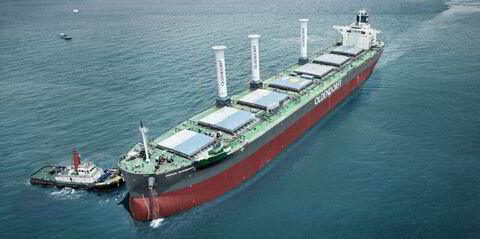Mitsubishi Heavy Industries (MHI) has signed on to a project to convert existing ships to run on carbon-free fuels.
The Japanese shipbuilder will undertake technical, financial and environmental assessments for the initiative led by the Maersk Mc-Kinney Moller Center for Zero Carbon Shipping, a Copenhagen-based research institute created to promote decarbonisation of the maritime industry.

The study is to aims to achieve carbon neutrality in existing ships, while identifying the challenges and reducing ship-related investment risks.
Participants in the initiative also include AP Moller-Maersk, American Bureau of Shipping, MAN Energy Solutions, NYK Line and Seaspan Corp.
The evaluations of the project will be conducted by MHI’s Mitsubishi Shipbuilding and Mitsubishi Heavy Industries Marine Machinery & Equipment.
“Under this project, technical assessments of safety aspects will be conducted relating to future solutions, including modification of existing container carriers, tankers and other existing ships to vessels that operate on ammonia, methanol and other decarbonised fuels,” MHI said.
“In addition, financial assessments will be undertaken pertaining to fuel conversion costs, technology investments, fuel costs and related maritime shipping costs. An environmental assessment will be conducted based on estimated cost benefits from reducing greenhouse gas emissions over a ship’s lifetime.”
MHI is also participating in developing guidelines for the safe usage of ammonia as a marine fuel under the same research institute.
Green ammonia is viewed as a potential long-term solution for marine industry as it results in zero carbon emissions. However, it is highly toxic.
“In order to introduce green ammonia as a safe and sustainable marine fuel, it is therefore vital to draw up safety guidelines for its usage, including implementation of specific assessments of its safety for humans, ship assets and the environment,” MHI said.
According to the research institute, the marine shipping industry generates about 3% of world’s carbon emissions each year.
The project, which launched in April, is expected to run throughout 2021.



